An Extraordinary Neighbor: Mohamed Bahe Is A Muslim Giving Back
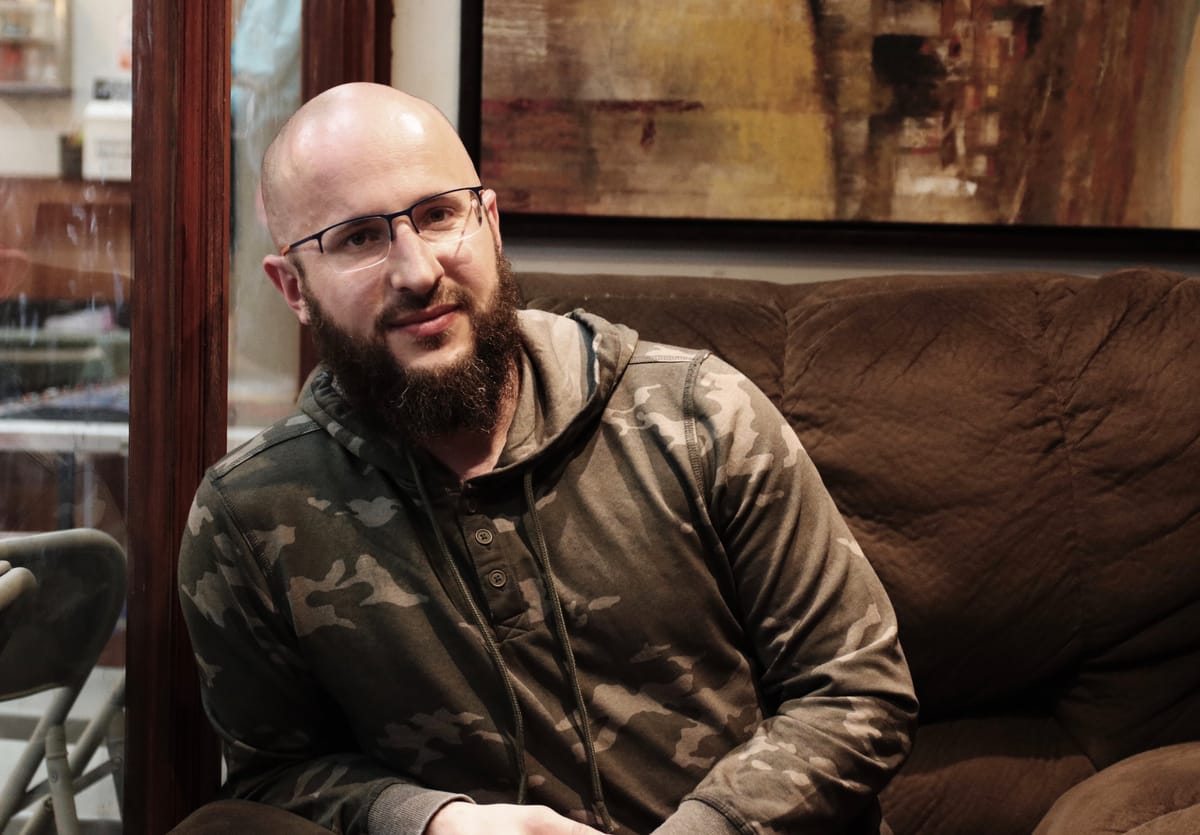

SUNSET PARK – Mohamed Bahe, 35, is humble. He’s the founder of the non-profit Muslims Giving Back but refers to himself as a volunteer. Muslims Giving Back has allowed Bahe to transform a mosque for the better, create a free bakery in Yemen, open a women’s shelter in Brooklyn, and feed the homeless every single week. This is his story.
Bahe, a bald man (by choice) with a beard and glasses, was born in Algeria. He came to the US in 1993 when he was just nine years old. At the time, there was a civil war happening in the country and it was not safe. Bahe’s family had applied for visas for the US and for Belgium, where his uncles lived, and had decided that whichever visa came first, that is where they’d go.
To New York it was. Then 9/11 happened.
SEPTEMBER 11
Bahe at the time was a typical kid in high school. He was on the football team, hung out with his friends after school, and enjoyed life. After 9/11, his teammates started making fun of his name, “Mohamed.”
“I was like ‘Oh boy.’ I just felt ashamed. I was like I’m named after some person who millions of people around the world follow and I know nothing about the guy,” Bahe said. “My friends were constantly asking me questions and I knew nothing.”
The time after 9/11 was devastating for Muslims living in America. Women took off their hijabs, men were traumatized, and children were targetted. People who were named Mohamed started going by “Moe.” Many Muslims started hiding their faith from the public.
But for Mohamed Bahe – “September 11, for me, was a huge wake-up call. It connected me to my belief and made me the person I am today.”
This one time, one of his friends printed verses from the Quran about the unbelievers and Bahe did not know how to respond, except by repeating that “Islam was peace”. He decided to go to the mosque the next day and ask the Imam.
“I asked him ‘Is there a verse in the Quran that says “if you meet an unbeliever you chop their necks off”?’ And the Imam says, ‘Yes, there is a verse like that.’ And I’m like what the hell!?” Bahe explained. “He told me the verse was out of context and then he explained it to me.”
At that point, Bahe decided to research about his faith himself. And when he did, he found out things about Islam he never knew before. Islam was always very robotic for him – he was constantly told that if he prayed five times a day and was a good Muslim, he’d go to paradise. If not, then he’d burn in hell.
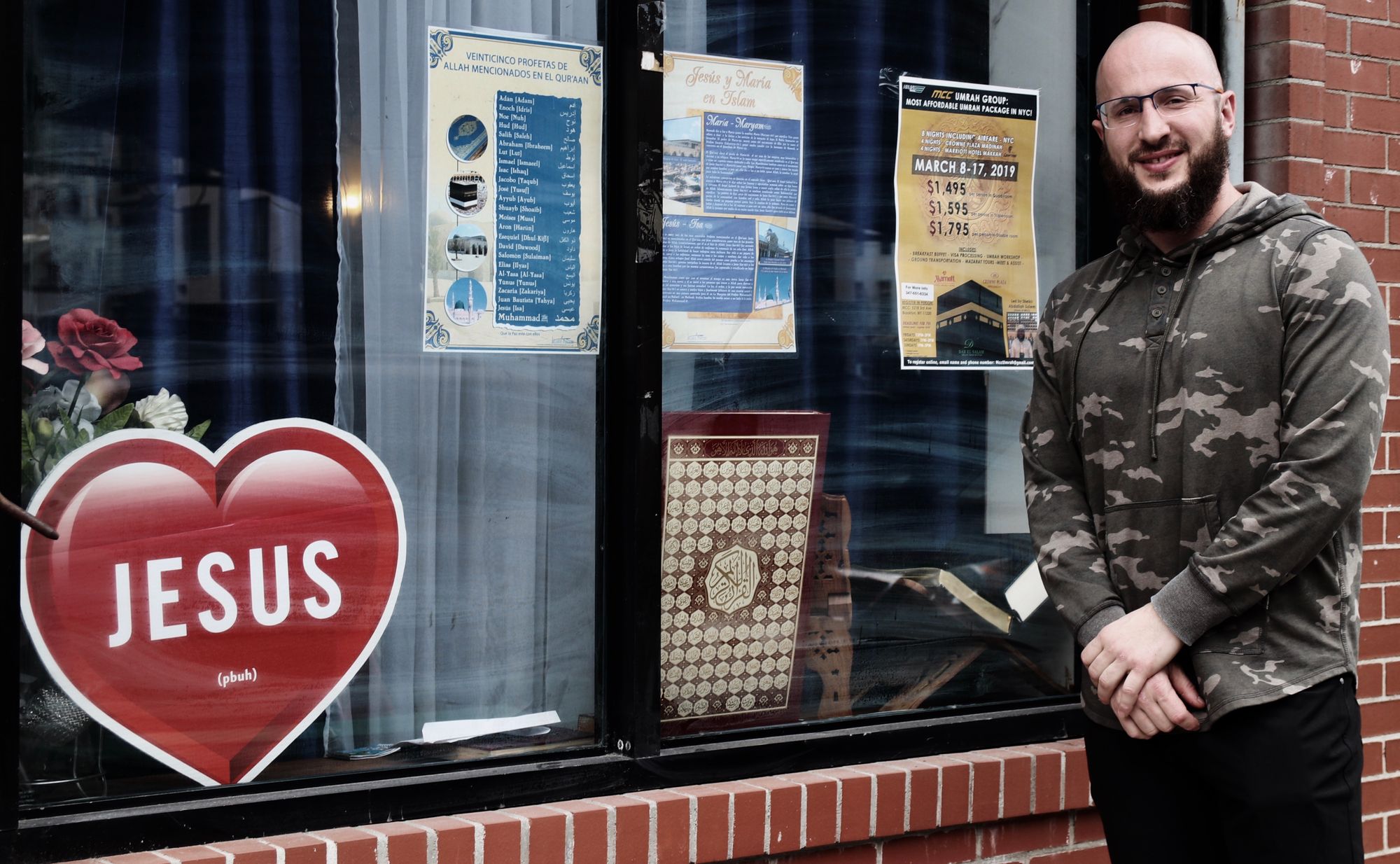
“But when I started reading about how flexible and merciful it was, I was like – wow this is legit,” he said. “At that point, I had two choices. Either I was going to defend my religion for the rest of my life telling people I condemn this and that. Or I’ll show everyone what Islam really is.”
Bahe chose the latter.
“That’s the path I think Muslims in America have to go through. We say a lot of things, but what happens when non-Muslims turn on their TV’s and see Muslims around the world doing crazy things?” Bahe said. “How many times is a non-Muslim going to hear a Muslim say ‘Islam is against terrorism. Islam is peace’? We have to show them through action.”
MUSLIM COMMUNITY CENTER
On a day in February, I entered the mosque on 3rd Avenue in Sunset Park expecting it to be quiet, as it was not yet time for prayer. But instead, I entered to find a group of children seated around Bahe as he read them a book. Later that day, another group of children was playing a game of dodgeball right inside the mosque. I had never seen anything like it.
Having the mosque become a part of children’s lives was very important to Bahe. It reminded him of his own experience that steered him away from a mosque for a year after high school.
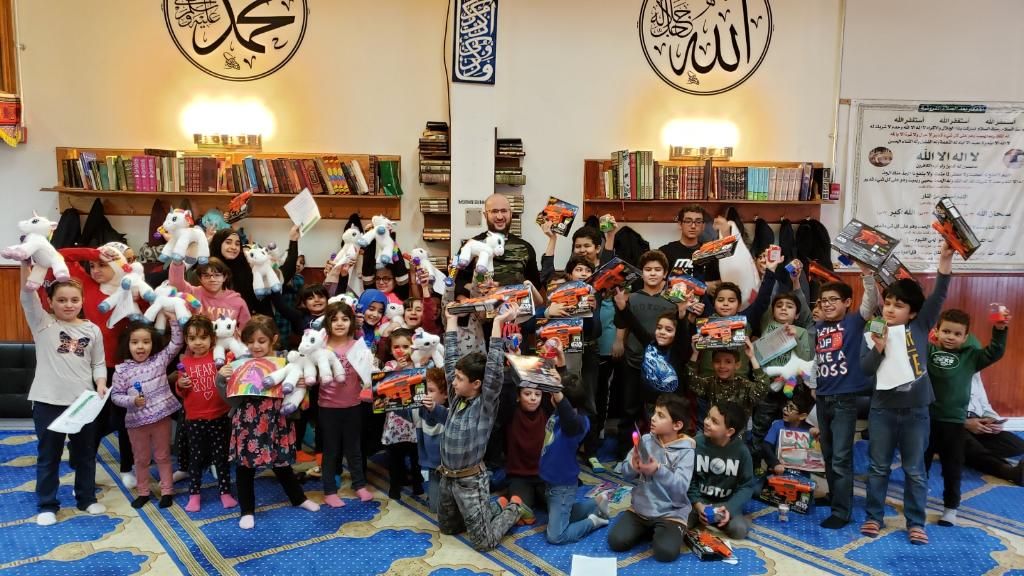
After 9/11, Bahe was very much into Metallica. One day, he was wearing a Metallica t-shirt which pictured a skull on fire. It was the weekly Jummah prayer and he sat in the mosque satisfied with how he was feeling. He felt spiritual and thought he could very much be able to do this every week. As he was about to leave, three men approached him and said stuff like, “Brother this is haram!” Bahe was very confused. What were they talking about? “Your shirt, astaghfirullah (a word of shame and disapproval) it has a skull!”
“I was like ‘It’s just Metallica, it’s nothing,'” Bahe recalled. “And that turned me off and I didn’t enter a mosque for like a year.”
Soon enough, Bahe realized that he couldn’t let one bad experience stop him. So he found a more accepting mosque and started attending there. As he got older, he realized that mosques were all ran by older men. And when he got the chance to take over the Muslim Community Center (located on 5218 3rd Avenue in Sunset Park) four years ago, he did it his own way.
“We got to do it completely different, but in a way where no one could ever pull out that Islam card and be the ‘haram police,'” Bahe said.
For the first six months, it was a struggle. Kids would be running around the mosque and the elders would yell at them. Bahe did not accept that.
“I told them [the elders] if they don’t like it here, there are two other masjids in the neighborhood. They could go there. I was willing to kick them out instead of the children,” he said. “But alhamdulillah (praise be to God), I had very good support from brothers and sisters.”
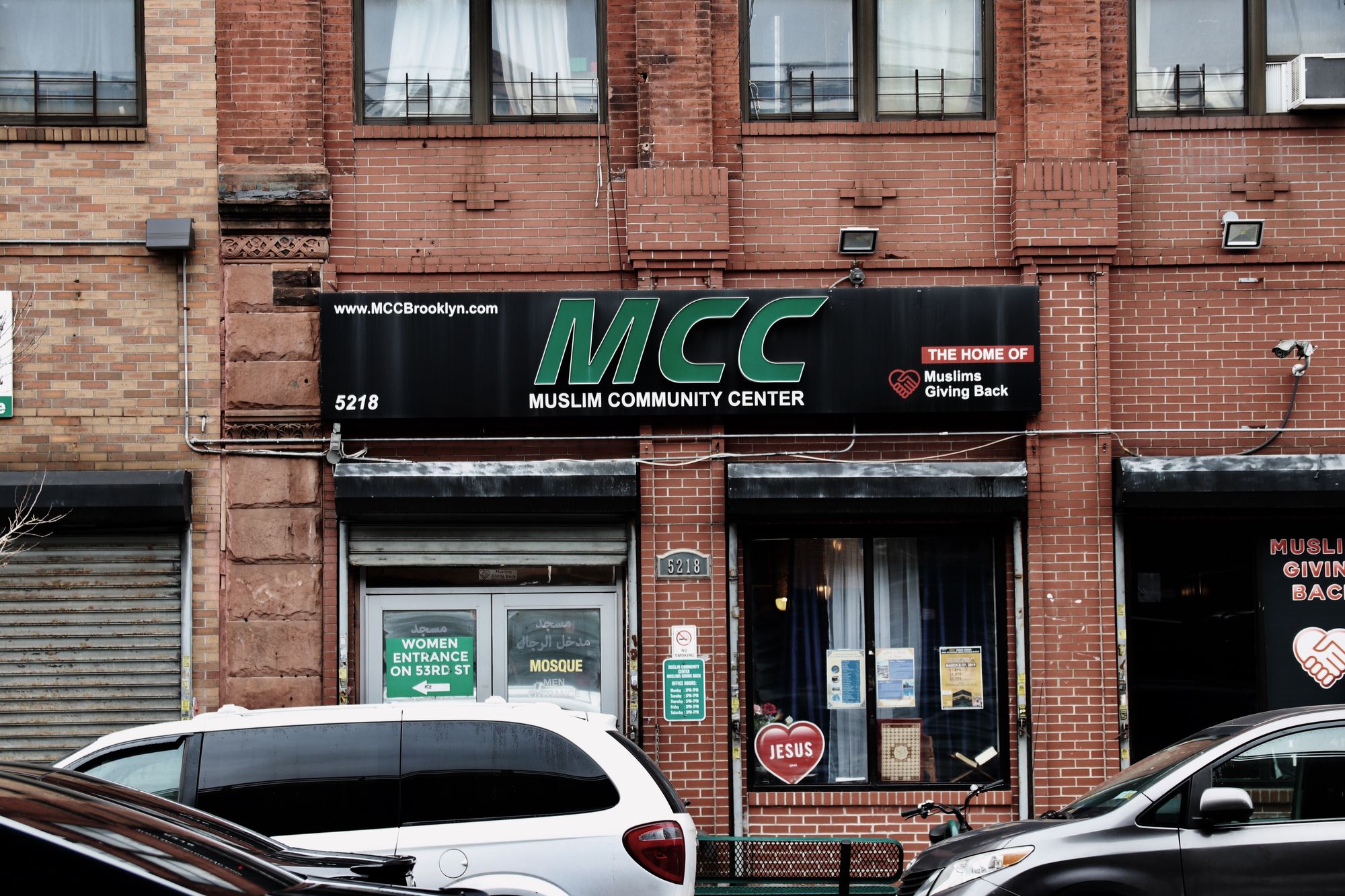
Now, the mosque is everything Bahe had ever wanted. It’s a real community center. There’s fresh coffee in the back, men walk in and sit on the couch, and women come in to use the bathroom.
“This was the environment more than 1,400 years ago,” Bahe said referring to when Islam first began. “It had to be. That’s the only way Islam flourished and everyone felt important and everyone felt they could contribute in some way.”
MUSLIMS GIVING BACK
Bahe volunteered with many organizations, with many mosques, but none of them were what he yearned for. He wanted something fast-paced. He wanted something consistent, rather than one ‘feed the homeless’ event every two or three months. So, he realized he just had to create his own organization. And he did.
“I felt like the organizations I volunteered with weren’t really genuine. It was always a photo-op,” he said. “We would go out to feed the homeless and there would be a cameraman every single time. Like, people would pass by and wonder if we were shooting a movie.”
Muslims Giving Back was formed five years ago. Its headquarters are at the Muslim Community Center. Every Friday and Saturday (for five years now), the mosque holds a food pantry and then goes out to feed the homeless. Their meals aren’t the regular peanut butter and jelly sandwiches – though Bahe says there is nothing wrong with those – they are mostly cooked meals.
“If we were going to do this on Islamic principles, then Islam teaches us to love for your brother what you love for yourself,” Bahe said. “If I were homeless and hungry, would I prefer a peanut butter jelly sandwich or rice and chicken and corn?”
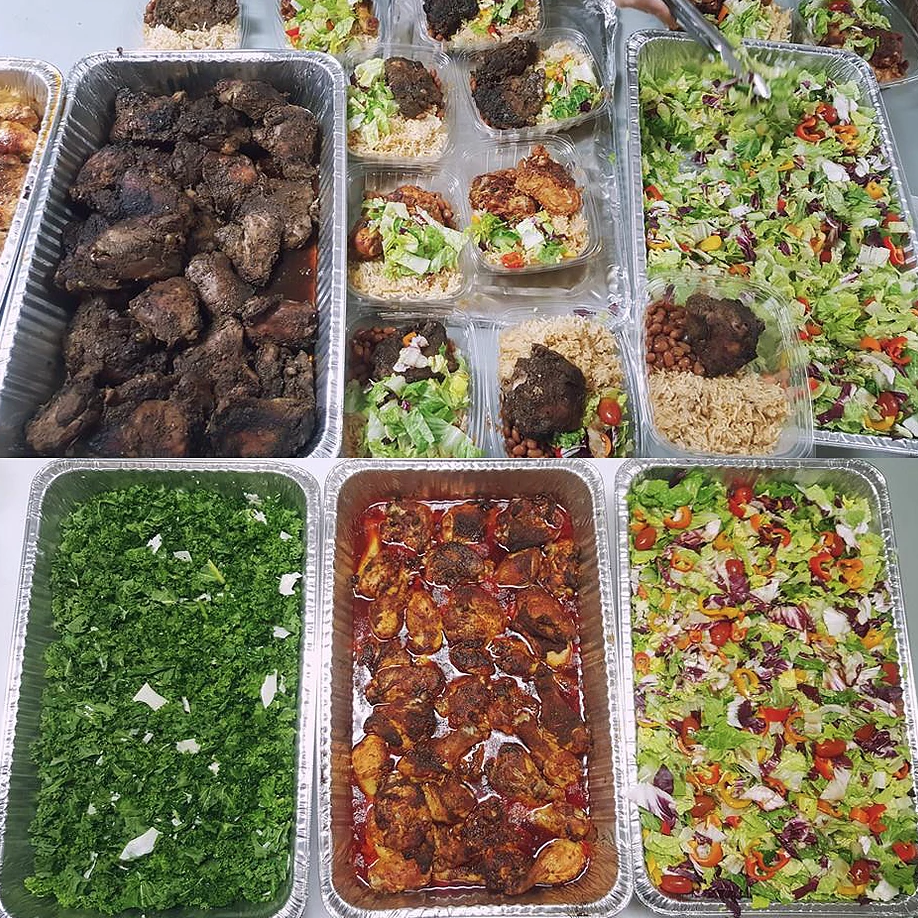
Bahe decided that if they were going to feed the homeless, they couldn’t just follow the wheel; it had to come from the heart. So, Muslims Giving Back cooks homemade food on the same day they are giving it out. They cook rice, chicken, and a variety of salads. They buy corn, vegetables, cranberries, and walnuts.
“I just put myself in their shoes. If someone gave me hot food, it shows they kind of really care about my situation. Like, it did not take them five seconds to spread peanut butter and jelly on two pieces of bread,” Bahe said. “It was made with love, seasoned properly, cooked at the right temperature, and packed nicely.”
MUSLIM SURVEILLANCE IN MOSQUES
When Muslims Giving Back was just formed, they operated from a mosque in Brighton Beach. Just a few months in, they found out that there was an NYPD informant at the mosque. Since 2002, the NYPD had been secretly surveilling Muslims inside mosques. Informants were referred to as “mosque crawlers” and befriended people inside the local mosques. They reported back everything they heard and saw to the NYPD.
“Muslims Giving Back had about 30 guys at the time. And apparently, someone was going ‘Oh no, what is going on here?'” Bahe said. “The informant was with us for eight to nine months. It was hard to believe because we weren’t even doing anything besides putting our money together to buy food for people.”
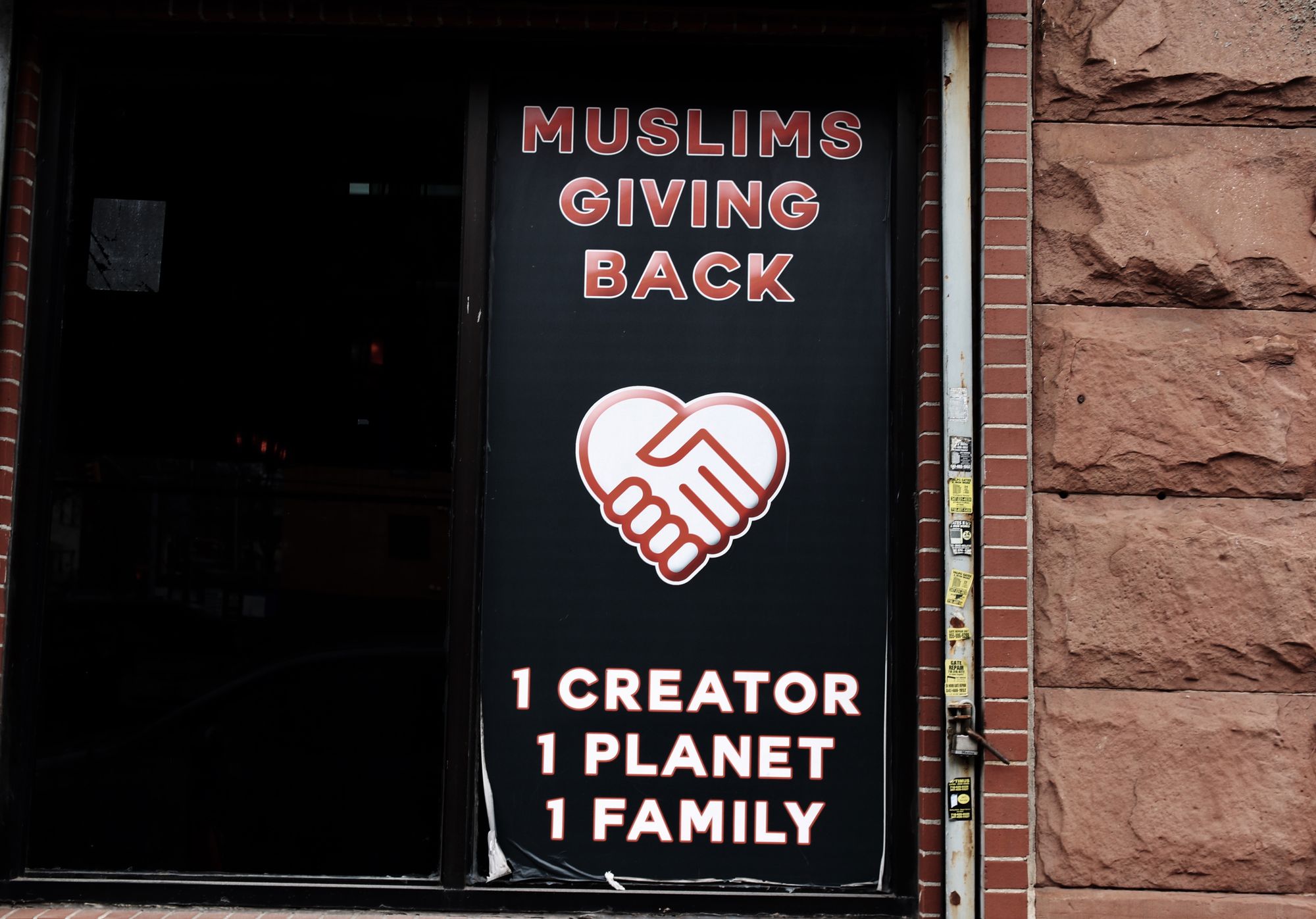
The mosque ended up kicking Muslims Giving Back out and about 90 percent of the volunteers dropped. Bahe was left with three other men and debated whether or not they should just give up.
“We didn’t do anything illegal. We were doing it sincerely, and if we didn’t do anything, then nothing could stop us,” Bahe said. “It was a big downer in the beginning because we were just trying to be good Muslims. We were trying to help the community. And then to think that there was a whole force out there monitoring us, following us, reading our texts; that was madness.”
Muslims Giving Back was also the only charitable organization that worked with the ACLU to file a lawsuit against the NYPD for its surveillance.
ASIYAH WOMEN’S CENTER
As Muslims Giving Back started becoming bigger and bigger, they became increasingly aware of the plight of single women in the community. Most of the women had similar stories; their husbands died, their husbands kicked them out, or their husbands beat them up. They started asking Bahe for help and began sleeping over at the Muslim Community Center.
“Like no way on earth am I going to tell a Muslim woman she can’t sleep here,” Bahe said.
Muslims Giving Back started paying for hotel rooms for these women, but that became too expensive. So Bahe thought, what was the problem? Why isn’t there a safe place for women and their children?
“We sit there and talk about women’s rights in Islam,” Bahe said. “If us men in our communities are hurting our wives and beating our wives and then they come to the mosque for help, we’re going to tell them no? What kind of nonsense is this? We’re supposed to be the protectors and all this crap we love to say. That had to stop.”
So, Bahe spoke to community members and was able to get loans from them. He remembers telling them, “I don’t know if I’m going to be able to pay you back, but we need to build this shelter.”
That’s when the Asiyah Women’s Shelter was born. It is located at a location in Brooklyn which they do not like to advertise to protect the women, both Muslim and non-Muslim. They have had over 40 women stay in the shelter. Some stay for a night, some stay for a month, and some stay for several months. Muslims Giving Back then helps transition women to long term public housing.
“The shelter was formed out of desperation,” Bahe said.
YEMEN’S MERCY BAKERY
In August of 2018, Muslims Giving Back formed a free bakery in Yemen, a country that is in dire need of humanitarian aid.
“The stories you hear about Yemen are crazy. Babies are starving to death,” Bahe said.
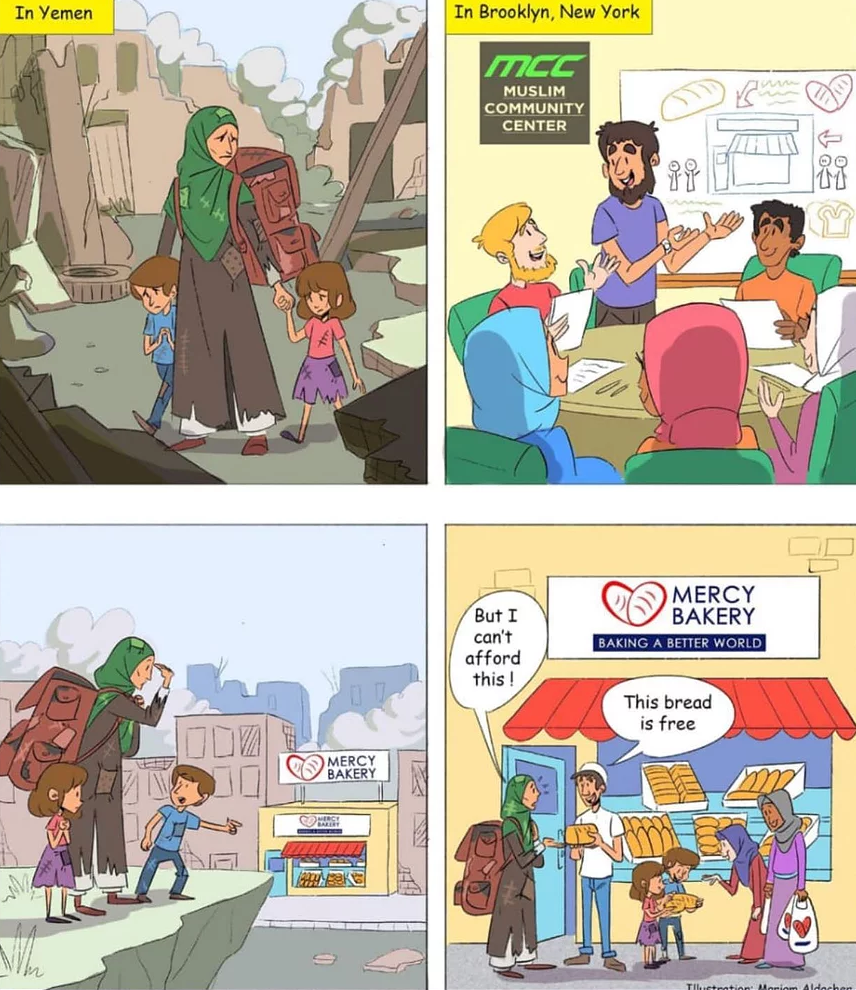
Bahe thought that if a person has at least one loaf of bread in their stomach every single day, then they won’t die. They’d be hungry, but they won’t die. That’s when he decided to build something that gives free bread daily. Currently, the bakery in Yemen is baking over 4,000 pieces of bread every single day.
“Imagine if people started following this model around the world?” Bahe said. “If everyone made a bakery, people won’t be able to starve to death. It’s much better than collecting money all year round and going back to do one big thing to help the people. By that time, probably half of the people would be dead. Do something small and just let it grow.”
HELPING OTHERS
Bahe has devoted his life to helping others. He says there is nothing more satisfying than helping someone.
“As a Muslim, charity is an obligation and that’s one thing that has been diluted in the Muslim community,” Bahe said. “We look at charity as something you do on the side or when you are depressed or you do it once a year to make you feel good. No, charity is an obligation.”
FIGHTING ISLAMOPHOBIA
“I call myself the biggest Islamophobe,” Bahe laughed. “Unless we realize we have a problem, we won’t be able to change.”
He gave an example. “Hi, my name is Mohamed and I am an alcoholic. It’s the same thing. Like, hi. My name is Mohamed and our community sucks and has to change.”
Bahe believes the best way to fight Islamophobia is by doing good deeds. He has a logic he falls back on. Let’s say a group of Muslims is feeding the homeless in the middle of the night. Then, a non-Muslim passes by. She goes, “Oh wow, look at them feeding the homeless.” Bahe says it’ll leave “a little thing in their heart.” Now that one person, a month or two later, will be out with her friends and a conversation pops up about banning Muslims or terrorism. According to Bahe, the woman might say, “It can’t be all Muslims. I was in Brooklyn and they were feeding the homeless.”
Bahe says every group is synonymous with a word. For Muslims, the word is terrorism. How do you destroy that word?
“You got to go public and tell people to come inside your mosque. We have nothing to hide,” he said.
This one time during a food pantry, a neighbor told Bahe he always wondered what happened inside a mosque. Bahe was confused. “What do you mean?” he asked.
“He told me every Friday a hundred people come inside for an hour. And then everybody runs out. He said ‘we don’t know what goes on in here’,” Bahe laughed.
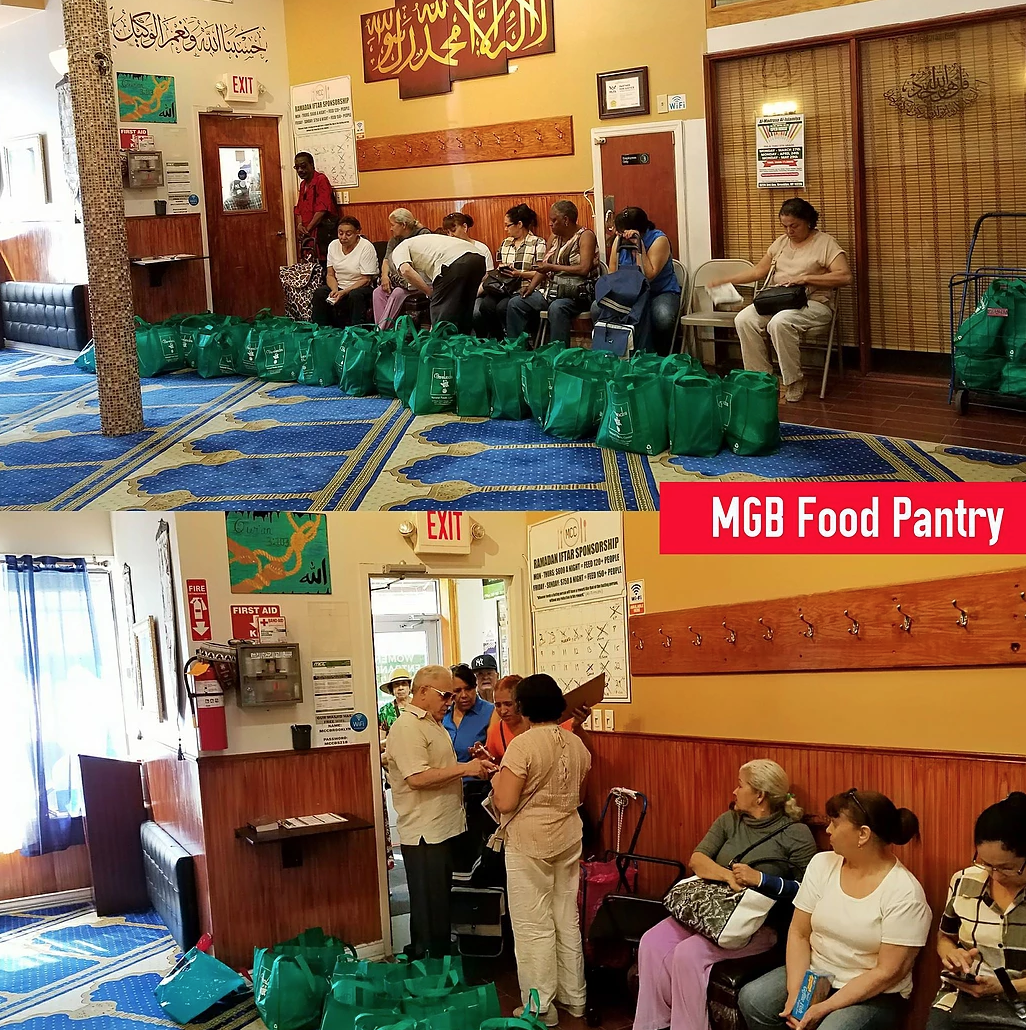
“If I were a neighbor and I heard on the news that Muslims are terrorists and are planning to kill us. And then I see a community going inside a shady place and when they come out, there’s no interaction. Of course, people are going to wonder what happens. Once you become active and open up your place, there is nothing to hide.”
FAMILY, SACRIFICE, AND THE FUTURE
Bahe is married and has two little boys: one is three years old and the other is nine months old. Bahe wishes he could spend more time with them, but he realizes the important work that needs to be done. Luckily for him, he has a very understanding wife.
“Before we married, I told her, ‘Listen, I am already married. Her name is Muslims Giving Back and you’re my second wife,'” Bahe laughed. “I told her this makes me good. If I am happy, I’m going to be a good husband. I am going to be a good father.”
Has the universe been good to him?
To this, he laughed. “I mean I’ve got my problems, financially and everything since I put so much time into this, but absolutely.”
For Bahe, helping others is an accomplishment itself, but hopes to one day see his vision taking over across the world.
“My whole concept is to show people how easy charity is in Islam. If you do it properly with a good heart, it becomes contagious,” Bahe said. “My goal is to see it in different forms across the world. It doesn’t matter who is doing it. There is no copyright when it comes to helping people.”
For more information on Muslims Giving Back, to donate, or to volunteer (they accept both Muslims and non-Muslims), check out their website.
Mohamed Bahe was nominated for a profile by Kashif Hussain. Know of an extraordinary neighbor we should profile? Email your nomination to editor@bklyner.com or get in touch with us on social media. Check out the past two extraordinary neighbors we profiled: Nowshin Ali and Anita Bulan.



